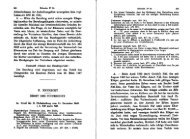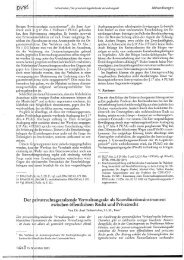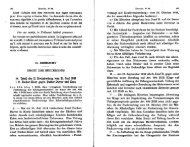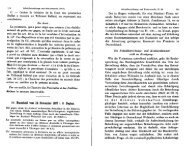- Seite 1 und 2:
Studien zur Rechtsphilosophie und R
- Seite 3 und 4:
Axel Tschentscher Prozedurale Theor
- Seite 5:
Meinen Eltern 5
- Seite 9:
Inhaltsübersicht Einleitung: Aufga
- Seite 12 und 13:
III.! Zu einigen anderen Gerechtigk
- Seite 14 und 15:
III.! Zur Klassifizierung prozedura
- Seite 16 und 17:
III.! Beobachter- und andere Standp
- Seite 18 und 19:
c)! Die rationale Kooperation .....
- Seite 20 und 21:
a)! Die materielle Verfassungsordnu
- Seite 22 und 23:
was genau eine Gerechtigkeitstheori
- Seite 24 und 25:
verbunden ist 11 . Die Gerechtigkei
- Seite 26 und 27:
Grundposition die vielversprechends
- Seite 28 und 29:
scher Rationalität' oder 'Handlung
- Seite 30 und 31:
haupt von 'Recht' die Rede sein kan
- Seite 32 und 33:
tungsanspruch ab: Rechtsgehorsam is
- Seite 34 und 35: prozeduralen Konzeptionen praktisch
- Seite 36 und 37: sich unmittelbar vor allem in verfa
- Seite 38 und 39: werden: Gerechtigkeit ist die Erfü
- Seite 40 und 41: genstände einer rechtlichen Regelu
- Seite 42 und 43: lich findet sich auch bei Habermas
- Seite 45 und 46: Zweiter Teil: Begriff und Klassifiz
- Seite 47 und 48: 2. Die Erforderlichkeit einer Gerec
- Seite 49 und 50: zelakte, bestimmte Situationen, bes
- Seite 51 und 52: Gerechtigkeit resultiert, mit desse
- Seite 53 und 54: Normale Moral Tugendpflicht - kann
- Seite 55 und 56: D 1D : D 1A : Gerechtigkeit im deon
- Seite 57 und 58: esonderen Gerechtigkeit (iustitia p
- Seite 59 und 60: verstehen wollen, ist die Verteilun
- Seite 61 und 62: heitsbezogener Richtigkeit, und nim
- Seite 63 und 64: materialen Verständnis der Gerecht
- Seite 65 und 66: Die Unterscheidung zwischen dem jur
- Seite 67 und 68: Linie axiologisch, begründen also
- Seite 69 und 70: eim menschlichen Handeln, das in D
- Seite 71 und 72: IV. Die Normen der Gerechtigkeit Mi
- Seite 73 und 74: Sozialbezug aufweist. Bis auf den S
- Seite 75 und 76: ücksichtigung aller relevanten Ges
- Seite 77 und 78: Setzt man D 1 in D 2 ein, so erhäl
- Seite 79 und 80: daß der Anwendungsbereich einer Ge
- Seite 81 und 82: dadurch entsteht, daß lediglich ei
- Seite 83: solche Position ist beispielsweise
- Seite 87 und 88: Rechte, und damit für das historis
- Seite 89 und 90: Zielerreichung anderweitig begründ
- Seite 91 und 92: in der Form des rationalistischen N
- Seite 93 und 94: folg der eigenen Handlungsweise ma
- Seite 95 und 96: Begründung einer kollektiven Ident
- Seite 97 und 98: Theorie im Einzelfall moralisches V
- Seite 99 und 100: ationalität bezeichnet das selbstl
- Seite 101 und 102: der Universalisierung des Standpunk
- Seite 103 und 104: 'echten' Vertragstheorien, die auch
- Seite 105 und 106: soziologische Herrschaftsanalysen u
- Seite 107 und 108: von Sandel und Kagan vorgenommen wo
- Seite 109 und 110: Sterba hat vorgeschlagen, aus diese
- Seite 111 und 112: ) Die Skalierbarkeitsthese als Ausw
- Seite 113 und 114: c) Ergebnisse In ihrer politischen
- Seite 115 und 116: Schon Rawls hat bewußt offen gelas
- Seite 117 und 118: c) Die Mindestgehaltsthese Letztlic
- Seite 119 und 120: giert in normativen Gerechtigkeitst
- Seite 121 und 122: folgenden ist mit prozeduraler Gere
- Seite 123 und 124: Damit ist deutlich, warum 'Fairneß
- Seite 125 und 126: det grundlegend zwischen vollkommen
- Seite 127 und 128: fahren nach den Regeln des Strafpro
- Seite 129 und 130: konstituiert: quasi-reine prozedura
- Seite 131 und 132: teilen. Das bietet den Vorteil, kei
- Seite 133 und 134: D 4 ': Prozedurale Theorien der Ger
- Seite 135 und 136:
außerdem die Systemtheorie, insbes
- Seite 137 und 138:
auf richtigkeitsverbürgende Verfah
- Seite 139 und 140:
(discourse theories) 447 untersucht
- Seite 141 und 142:
auszubauen 459 . Theorien rationale
- Seite 143 und 144:
Dritter Teil: Einige Theorien der G
- Seite 145 und 146:
auf Gerechtigkeit beantwortet, entw
- Seite 147 und 148:
gensatz zur sozialistischen Planwir
- Seite 149 und 150:
anzen von den Betroffenen akzeptier
- Seite 151 und 152:
tische (H.R. Maturana/F.J. Varela 5
- Seite 153 und 154:
Durch die inhaltlichen Ziele werden
- Seite 155 und 156:
ung - insoweit gibt es eine Überei
- Seite 157 und 158:
Ziel ist nicht mehr durch Verfahren
- Seite 159 und 160:
Einigkeit nur insoweit, als Ursprü
- Seite 161 und 162:
Werte in dieser Stadt verstoßen 12
- Seite 163 und 164:
sowie in der Erhebung des Marktes z
- Seite 165 und 166:
nach ihrem Sachbereich annimmt. Wal
- Seite 167 und 168:
V. Ergebnisse Die Theorien der aris
- Seite 169 und 170:
Im hier interessierenden Zusammenha
- Seite 171 und 172:
Erfolg des einzelnen nicht nur vom
- Seite 173 und 174:
von J.F. Nash, J.C. Harsanyi und R.
- Seite 175 und 176:
3. Theorie der relevanten Gleichgew
- Seite 177 und 178:
net also die Situation, in der P un
- Seite 179 und 180:
Vereinbarung festgeschrieben wird.
- Seite 181 und 182:
weder der kantischen noch der utili
- Seite 183 und 184:
wurde 261 , ist die Rawlssche Vertr
- Seite 185 und 186:
zen der gerechten Aneignung, Übert
- Seite 187 und 188:
mentativen Erstreckung der (analyti
- Seite 189 und 190:
sondere die Umverteilung von Güter
- Seite 191 und 192:
D 1G : Gerechtigkeit im Sinne des P
- Seite 193 und 194:
aber keinen Ausweg aus dem damit um
- Seite 195 und 196:
) Institutionalisierte Gerechtigkei
- Seite 197 und 198:
V. Ergebnisse Mit Ausnahme der Theo
- Seite 199 und 200:
kurstheorien) oder der überindivid
- Seite 201 und 202:
Die Übereinkunft ist als ein mehrs
- Seite 203 und 204:
) Zwei Prinzipien der Gerechtigkeit
- Seite 205 und 206:
fassunggebung, Gesetzgebung und Ges
- Seite 207 und 208:
keit geführt werden, soweit die Di
- Seite 209 und 210:
view), die für unterschiedliche um
- Seite 211 und 212:
3. Theorie der Gerechtigkeit als Un
- Seite 213 und 214:
ge, wenn auch nicht die alleinige R
- Seite 215 und 216:
2. Theorie der Gerechtigkeit als Un
- Seite 217 und 218:
gewähren könnten. Wenn beispielsw
- Seite 219 und 220:
Diskursen, zwischen idealen und rea
- Seite 221 und 222:
stimmung oder als autoritative Ents
- Seite 223 und 224:
gehen, sie schlagwortartig und nach
- Seite 225 und 226:
c) Die Begründung der Diskursregel
- Seite 227 und 228:
hauptung nachzuliefern 488 . Das sc
- Seite 229 und 230:
ische Geltung verlangt zeitlich-rä
- Seite 231 und 232:
Eine gemeinsame Behauptung der Disk
- Seite 233 und 234:
Handelnden, sondern an der Richtigk
- Seite 235 und 236:
) Das Handlungsprinzip (U h ) In 'T
- Seite 237 und 238:
notwendige Bedingung des zweiten Zi
- Seite 239 und 240:
Begründung sozialer Ordnung und is
- Seite 241 und 242:
c) Die Gerechtigkeitsprinzipien in
- Seite 243 und 244:
ältere Begriffsbestimmungen der 'd
- Seite 245 und 246:
ven Einhegung mittels Berufskodex,
- Seite 247 und 248:
Politik eine zentrale Bedeutung in
- Seite 249 und 250:
Worten: Wer nicht als 'einsamer Wol
- Seite 251 und 252:
Freunde). Die Anerkennung gilt auß
- Seite 253 und 254:
angehörige oder Freunde wissen, da
- Seite 255 und 256:
um nicht zu Opfern zu werden, auf d
- Seite 257 und 258:
5. Theorie des neutralen Dialogs (B
- Seite 259 und 260:
hen und konsequenterweise alle inst
- Seite 261 und 262:
Vierter Teil: Analyse und Kritik vo
- Seite 263 und 264:
sprucht und muß auch nicht beanspr
- Seite 265 und 266:
II. Zur Kritik an der Gerechtigkeit
- Seite 267 und 268:
ganz ohne das regelhafte Rahmenwerk
- Seite 269 und 270:
echtigkeit 47 ) muß zumindest die
- Seite 271 und 272:
kommen, so ist auch soziale Interak
- Seite 273 und 274:
d) Zwei Bedingungen rationalen Verh
- Seite 275 und 276:
Lucas und Gauthier als irrational z
- Seite 277 und 278:
Nach dem von Parfit geschilderte Be
- Seite 279 und 280:
4. Ergebnisse Die Spieltheorie als
- Seite 281 und 282:
gen nicht ausschließen, geraten ab
- Seite 283 und 284:
lungssphären niemand mehr sagen ka
- Seite 285 und 286:
1. Zur Kritik an J. Rawls entscheid
- Seite 287 und 288:
ster Konzeptionen des Guten (Religi
- Seite 289 und 290:
warum die dialogische Konzeption zu
- Seite 291 und 292:
hier nicht im einzelnen dargestellt
- Seite 293 und 294:
welchen Bedingungen ihre Ergebnisse
- Seite 295 und 296:
2. Zur Kritik an K.-O. Apels Transz
- Seite 297 und 298:
Rechtsmedium als solches« 187 . Di
- Seite 299 und 300:
weitgehende Übereinstimmung dahing
- Seite 301 und 302:
ten in Habermas Theorie ist dieser
- Seite 303 und 304:
Möglichkeit der Legitimation »auf
- Seite 305 und 306:
Diskussion einläßt und die Argume
- Seite 307 und 308:
ve Kontrolle des Handelns ist ein A
- Seite 309 und 310:
Fünfter Teil: Grundzüge einer Dis
- Seite 311 und 312:
Normen näher einzugrenzen, ist ein
- Seite 313 und 314:
die These vertreten, daß jedes Par
- Seite 315 und 316:
konzentriert 34 . Menschenrechte un
- Seite 317 und 318:
feststehendes Ergebnis real zu erre
- Seite 319 und 320:
Es ist zudem fraglich, ob sich die
- Seite 321 und 322:
II. Die diskurstheoretisch notwendi
- Seite 323 und 324:
diskursiv kontrollieren lassen mü
- Seite 325 und 326:
dadurch ausgehebelt werden, daß in
- Seite 327 und 328:
2. Zur Begründung der Freiheit a)
- Seite 329 und 330:
Sämtliche Einzelrechte sind diskur
- Seite 331 und 332:
estimmbare Vielzahl von individuell
- Seite 333 und 334:
C. Zur Institutionalisierung der Ge
- Seite 335 und 336:
1. Die Merkmale des demokratischen
- Seite 337 und 338:
damit eine Situation der inhaltlich
- Seite 339 und 340:
weise in der demokratischen Legitim
- Seite 341 und 342:
wie bei Änderung der (materiellen)
- Seite 343 und 344:
erfüllt sein, die eine den Umstän
- Seite 345 und 346:
3. Die parlamentarische Gesetzgebun
- Seite 347 und 348:
hern das Verfahren so weit, wie nac
- Seite 349 und 350:
Parallelbegriff der Fraktion verkö
- Seite 351 und 352:
politischen Führern und Meinungsbi
- Seite 353 und 354:
tig 222 . Dem kann das Medienrecht
- Seite 355 und 356:
c) Zur Wohlfahrtsstaatlichkeit als
- Seite 357 und 358:
IV. Zur Wirtschaft 1. Die Wirtschaf
- Seite 359 und 360:
echtigkeit gegenüber der Natur (Ti
- Seite 361 und 362:
IV. Zur Gerechtigkeit unter den Ges
- Seite 363 und 364:
Schluß: Die Untersuchungsergebniss
- Seite 365 und 366:
8. Die Theorien der aristotelischen
- Seite 367 und 368:
17. Juristische Verfahren lassen si
- Seite 369 und 370:
Anhang: Definitionen, Theoreme und
- Seite 371 und 372:
D 4E : D 4K : D 4N : D 4RC : D Di :
- Seite 373 und 374:
N D : N E : N F : N G : N M : N oD
- Seite 375 und 376:
Literaturverzeichnis Aarnio, Aulis:
- Seite 377 und 378:
- /Kettner, Matthias (Hrsg.): Die e
- Seite 379 und 380:
- Historical ievitability. Auguste
- Seite 381 und 382:
- Deliberation and Democratic Legit
- Seite 383 und 384:
Engisch, Karl: Auf der Suche nach d
- Seite 385 und 386:
- Die Möglichkeit praktischer Erke
- Seite 387 und 388:
- Morality and the Theory of Ration
- Seite 389 und 390:
- Ragione pubblica o ragione politi
- Seite 391 und 392:
Kern, Lucian: Von Habermas zu Rawls
- Seite 393 und 394:
- Bemerkungen zum Problem der Letzt
- Seite 395 und 396:
Manthe, Ulrich: Beiträge zur Entwi
- Seite 397 und 398:
Okin, Susan M.: Justice, Gender, an
- Seite 399 und 400:
Reese-Schäfer, Walter: Lyotard zur
- Seite 401 und 402:
Schulze-Fielitz, Helmuth: Theorie u
- Seite 403 und 404:
- (Hrsg.), Multikulturalismus und d
- Seite 405 und 406:
- Zur Theorie der politischen Argum
- Seite 407 und 408:
Sachregister Apartheid 24, 323, 325
- Seite 409 und 410:
- weiter Gerechtigkeitsbegriff 48,
- Seite 411 und 412:
- strategischer Charakter 348 f. Po
- Seite 413 und 414:
Personenregister Aarnio, A. 49, 78,
- Seite 415 und 416:
Jellinek, G. 30, 141, 347 Jhering,
- Seite 417:
Skirbekk, G. 359 Skubik, D.W. 115 S


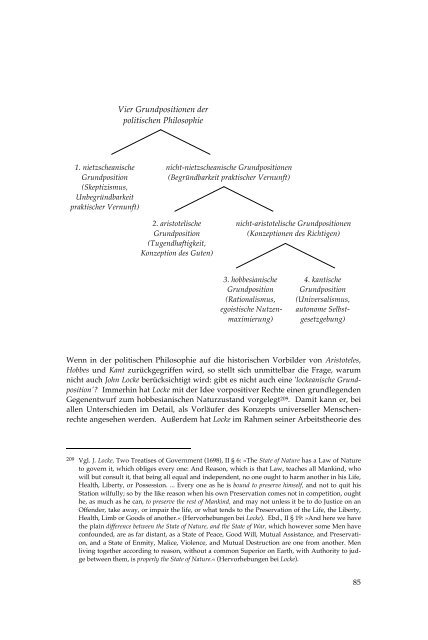
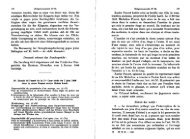
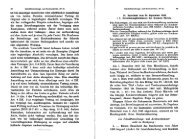
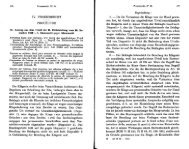
![Seminararbeit [Masterarbeit] - servat.unibe.ch - Universität Bern](https://img.yumpu.com/26241815/1/184x260/seminararbeit-masterarbeit-servatunibech-universitat-bern.jpg?quality=85)
